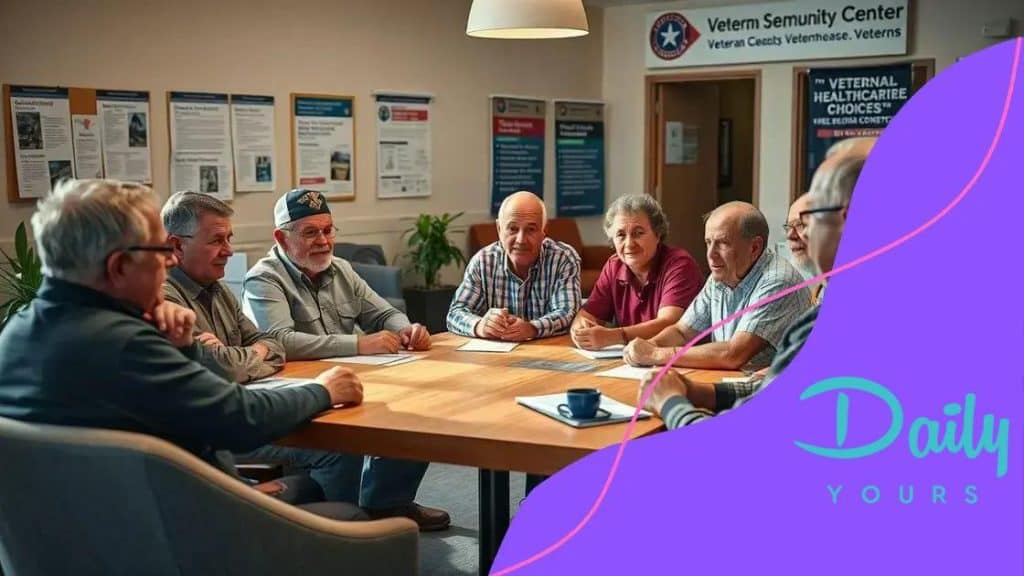Veterans’ healthcare programs and the future of federal support

Anúncios
Veterans’ healthcare programs are evolving to include improved access through technology, personalized care, and community support, addressing the unique challenges faced by veterans in receiving quality healthcare.
Veterans’ healthcare programs play a vital role in supporting those who’ve served our country. Have you ever wondered how these programs are adapting to meet the needs of veterans today? Let’s dive into this important topic.
Anúncios
The evolution of veterans’ healthcare programs
The landscape of veterans’ healthcare programs has undergone significant transformation over the years. These changes are crucial for meeting the diverse needs of veterans today. Understanding this evolution can help us appreciate how these programs have adapted to better serve our heroes.
Key historical milestones
Throughout history, several key milestones have shaped veterans’ healthcare programs. From the establishment of the first veterans’ hospitals to the introduction of modern healthcare reforms, each step has contributed to the current system. The evolution continues as new challenges arise, emphasizing the need for continuous improvement.
Modern adaptations
Today, veterans’ healthcare programs leverage advanced technology and practices. For instance, telehealth services have made accessing care easier for veterans in remote areas. This accessibility is vital for those who may face transportation challenges. Additionally, mental health services have expanded significantly, highlighting the importance of caring for the whole veteran.
Anúncios
- Expansion of telehealth options
- Increased focus on mental health care
- Integration of holistic treatment methods
As society progresses, the expectations surrounding federal support for veterans evolve as well. Advocacy groups play a crucial role in identifying gaps and promoting necessary changes. They ensure that veterans receive comprehensive care that adapts to their unique experiences and challenges.
Challenges and solutions
The evolution of veterans’ healthcare programs is not without its challenges. Issues such as funding limitations and bureaucratic hurdles can impact the quality of care. However, solutions exist. Increased collaboration between agencies and enhanced community support can pave the way for better outcomes.
In conclusion, the evolution of veterans’ healthcare programs reflects a commitment to bettering the lives of those who served our country. Staying informed about these changes is essential for ensuring that veterans receive the care they deserve. Understanding these transformations can empower us all to advocate for further improvements.
Key benefits of federal support for veterans
Federal support plays a crucial role in enhancing veterans’ healthcare programs. Understanding the key benefits of this support sheds light on how it impacts the lives of veterans and their families.
Access to comprehensive healthcare
One of the main benefits of federal support is the increased access to comprehensive healthcare services. Programs funded by the government ensure that veterans can receive medical attention without the burden of high costs. This access is vital for preventing illness and promoting well-being.
Financial assistance and benefits
In addition to healthcare access, federal support provides financial assistance that can greatly aid veterans. This can include:
- Direct healthcare subsidies
- Disability compensation for service-related injuries
- Housing assistance programs
- Support for education and training opportunities
These programs help veterans transition into civilian life more easily. The financial benefits ensure that they can support themselves and their families while adjusting to a new lifestyle.
Moreover, the emotional and psychological support available through federal programs cannot be overlooked. Mental health services are increasingly prioritized, recognizing that many veterans face challenges after serving. Access to therapy and counseling can lead to better mental health outcomes.
Community engagement and resources
Another significant advantage of federal support is the emphasis on community engagement. Veterans’ services not only provide medical care but also create a network of support for veterans. Community programs can offer:
- Social activities to reduce isolation
- Resources for job placement
- Workshops for skills development
Engagement with peers can help veterans adapt and connect, fostering a sense of belonging. Federal support encourages these kinds of community-building initiatives, which are essential for veterans’ reintegration.
In summary, federal support for veterans offers essential benefits that enhance their overall quality of life. From healthcare access to community resources, these programs make a meaningful difference.
Challenges faced in the current healthcare system

The current healthcare system for veterans encounters various challenges, which impact the quality of care they receive. Understanding these obstacles is essential to improving veterans’ healthcare programs.
Access to timely care
One significant challenge is the access to timely care. Many veterans experience long wait times for appointments, leading to delays in treatment. This can be particularly harmful for those with urgent health needs, as waiting can exacerbate their conditions.
Bureaucratic hurdles
The bureaucratic nature of the healthcare system also presents issues. Veterans often navigate complex paperwork and numerous regulations, which can be overwhelming. This complexity can make it difficult for veterans to access the benefits and care they deserve.
- Complicated claims processes
- Lack of clear communication from agencies
- Limited resources for in-person assistance
Furthermore, staffing shortages in veterans’ healthcare facilities contribute to inadequate care. With fewer healthcare professionals available, the quality and accessibility of care can decline. Many veterans find themselves without the necessary support for mental and physical health needs.
Stigma around mental health
Mental health remains a significant concern within the veterans’ community. Unfortunately, a stigma around seeking help can prevent veterans from accessing essential mental healthcare services. Many fear being judged or misunderstood, which creates barriers to treatment.
Additionally, funding limitations can hinder the development of innovative programs and services that cater to veterans’ unique needs. These financial challenges impact the ability to effectively address both physical and mental health care.
Ultimately, addressing these challenges is crucial for improving the overall health and well-being of veterans. By recognizing and tackling these issues head-on, we can enhance the effectiveness of support provided to those who have served our country.
Future trends in veterans’ healthcare services
The landscape of veterans’ healthcare services is evolving rapidly, and future trends aim to improve the quality and accessibility of care for veterans. Understanding these trends is crucial for preparing for the healthcare needs of our veterans.
Integration of technology
One major trend is the integration of technology in healthcare delivery. Telehealth services have become a game-changer, allowing veterans to access care from home. This is especially beneficial for those in remote areas where medical facilities are scarce. Virtual appointments can save time and reduce travel stress.
Personalized healthcare approaches
Another emerging trend is the move towards personalized healthcare. This involves providing tailored treatment plans based on individual needs. Advances in genetic research and data analysis enable healthcare providers to offer more effective treatments. Personalized approaches can enhance overall health outcomes for veterans.
- Customized mental health support
- Individualized physical rehabilitation programs
- Targeted preventative care measures
In addition to technology and personalization, there is a growing emphasis on holistic care. This approach considers both physical and mental health as equally important. Programs focusing on wellness, nutrition, and fitness are gaining traction, addressing the overall well-being of veterans.
Community-based initiatives
Community-based initiatives are set to expand as well. These programs connect veterans with local resources, creating supportive networks. Partnerships with local organizations can provide veterans access to employment services, social activities, and housing resources.
Furthermore, advocacy for policy changes is essential. Veterans and their supporters are actively pushing for reforms that enhance healthcare services. This includes advocating for increased funding and improved regulations that prioritize veterans’ health needs.
As we look to the future, the evolution of veterans’ healthcare services shows great promise. By embracing technology, personalized care, and community support, we can ensure that veterans receive the quality care they deserve.
How to advocate for improved veterans’ healthcare
Advocating for improved veterans’ healthcare is crucial for ensuring that those who served our country receive the care they deserve. Engaging in advocacy can make a significant difference in the lives of veterans.
Understanding the issues
To effectively advocate, it is essential to understand the key issues facing veterans’ healthcare. Familiarize yourself with problems such as long wait times, lack of access to mental health services, and inadequate funding for healthcare programs. By knowing these issues well, advocates can speak convincingly and provide accurate information to others.
Building a network
Connecting with others who are passionate about veterans’ issues is vital. Consider joining veterans’ organizations or community groups that focus on improving healthcare for veterans. These networks can provide support and amplify your voice. Building alliances with like-minded individuals helps strengthen advocacy efforts.
- Participate in community meetings
- Join social media groups focused on veterans’ issues
- Collaborate with local advocates and leaders
Furthermore, engaging with lawmakers is an essential step in advocating for change. Reach out to your local representatives and discuss the importance of veterans’ healthcare. Share personal stories and experiences that highlight the need for improved services. Lawmakers need to hear from constituents to understand the impact of their decisions.
Use social media for awareness
Social media platforms can be powerful tools for advocacy. Use them to raise awareness about veterans’ healthcare issues and connect with others. Share articles, create posts, and participate in online discussions related to veterans’ health. The more visibility these issues receive, the greater the likelihood of generating action.
Organizing public events also plays a role in advocacy. Hosting workshops, rallies, or informational sessions can help educate the community about veterans’ healthcare challenges. These events can also empower veterans to share their experiences and advocate for themselves.
In essence, becoming an advocate for improved veterans’ healthcare involves understanding the issues, building a supportive network, and engaging the community. By taking action, advocates can contribute to positive changes that benefit our veterans.
FAQ – Frequently Asked Questions about Veterans’ Healthcare Advocacy
Why is advocating for veterans’ healthcare important?
Advocating for veterans’ healthcare is crucial to ensure that veterans receive the quality care and services they deserve after serving our country.
How can I get involved in veterans’ healthcare advocacy?
You can get involved by joining local veterans’ organizations, participating in community events, and voicing your concerns to lawmakers.
What are common challenges in veterans’ healthcare?
Common challenges include long wait times for appointments, limited access to mental health services, and bureaucratic hurdles that complicate the care process.
How does community engagement help veterans?
Community engagement creates a support network for veterans, providing access to resources, social connections, and advocacy for better healthcare services.





